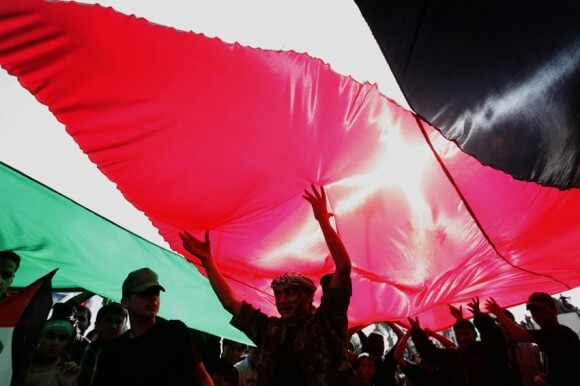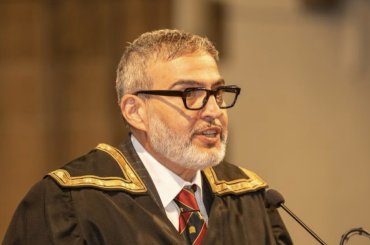The recent news that a group of Muslim Americans – which is the way they’ve identified themselves – assaulted a Palestinian activist and writer in Jerusalem was particularly upsetting. Coming in the wake of the murders in Paris the issue of “Islamic” identity has attained a heightened degree of obnoxiousness. In France, many native-born French people of North African descent lead secular lives – yet they’re “immigrants” and “Muslims.” In Palestine, Christians, Muslims, Jews, and atheists all come together to reject apartheid. Yet, a group of “Muslim Americans” is somehow privileged on the issue. Made into a prophylactic fig leaf wrapped protectively around the Islamophobes who sponsored their visit.
The idea that Palestine is a Muslim issue is one that a lot of people believe in. It’s something that even some Palestinians, who ought to know better, believe in. They regard what’s happening to them in their homeland as a stage in God’s history; the assaults on their holy places are firmly understood in that context.
The problem with that view is that Palestinian society is not Muslim. And Palestinian history never developed within an Islamic context, although aspects of it have. The rise of the Islamic political players is partly attributable to the failure of pan-Arabism and end of Nasserism. That’s true. It’s an interesting social history but it’s not the end of history. Secular parties founded by Christians and Muslims preceded Hamas – which has lasted long enough to see BDS inherit its resistance mantle. BDS, it’s worth noting, is a non-denominational, non-sectarian, non-ethnic call for justice. And the “Muslim Americans” are being pilloried for violating the tenets of the BDS movement (and for assaulting a Palestinian), not those of Islam.
So why is the Palestine-is-a-Muslim-problem line so destructive? Who are the people who seek to offer it as a credible structural description?
Even before 9/11 members of the Zionist establishment in Israel had a strong incentive to identify their conflict with something colossal: The Clash of Civilizations. Describe the war on the Palestinians not as the latest expression of colonialism or apartheid, but as the war on an “Islamofascist” ideology. Situate oneself in the warm heaving center, the radiant source of global opprobrium and high-minded finger-wagging. Where Leopold II, Churchill, De Gaulle (and Salan) stand tall and declaim, proclaim and otherwise lecture.
But the romantic global war is only one part of why Shalom Hartman is buying people who purport to be Muslims – ultimately an irrelevant identifier. From the perspective of operational effectiveness, the apartheid machinery’s gnashing mechanism works best when things are sifted. Like paper and plastic, Muslim and Christian refuse is best sorted before processing. Anything that reinforces that separation – different treatment for Christians for example – enhances the effectiveness of the apartheid regime. In this case, efforts made at “healing” between the “Muslim” and “Jewish” communities enhance the perception that the challenge is radical Islam, not the apartheid regime that destroys all Palestinians alike.
Any yet, there are Palestinians who insist that their struggle is a religious one. Some members of Islamic Jihad and Hamas for instance. Why would they participate in the elaborate lie presented by Shalom Hartman and others? Well, mainly, because there’s genuine diversity in Palestinian life – just as with other societies. That diversity, which enables one to consider competing ideas at the same time also enables Edward Said, George Habash, and Hanan Ashrawi to rest easily in the same matrix as every other Muslim/Christian/atheist Palestinian. One that holds each of them as equal – especially in their spirit of resistance to apartheid.
So, will Muslims around the world continue to identify with Palestine because of their faith? Yes, it seems likely that they will. And Christians and Jews may as well. But should that provide any of them with a privileged voice? No. Rather, people of conscience everywhere ought to be united on Palestine through a commitment to global justice. And if a few “Muslim Americans” falter on that score, well that’s mainly their own, moral failure.



Reasonable article. I do agree that the “Palestine Issue” is centrally a human rights and colonialist/territorial issue and trying to solve the problem should focus mainly on those aspects. But an article that tries to explain why the Palestine Issue is not mainly an Islamic/Religious issue, while not once specifically mentioning the Islamic significance of Jerusalem, the “Prophet’s Night Journey,” the al-Aqsa mosque, The Temple Mount, or The Dome of the Rock is, I believe, significantly incomplete. Briefly mentioning those issues within an article like this, so as to refute their centrality, would give this article more weight (mentioning “…the assaults on their holy places are firmly understood in that context,” is not enough imo). Instead, not explaining them at all, unfortunately, creates the appearance of a “willful omission” in my opinion. No offense intended…
It’s essentially an ethnic conflict between Jews and Arabs, with some minorities mixed in for good measure.
LOL. Looks like another uncorroborated EI story. There’s no assault on the video.
And by the way, Ahmed, Muslims are allowed to go to Israel, whether you or the EI mafia want them to or not.
The US media’s racist anti-semitic depictions of swarthy looking Palestinians dressed as Middle Eastern mullahs would have us belive that Islam is the problem.
FANTASTIC article, Ahmed! Thank you!
I put an enormous amount of blame on the GoI for repeatedly attempting to link/conflate Hamas with ISIS ~ it was/is completely insane and false, of course. Yet many in the MSM and elsewhere ran with it to my utter disgust.
All of my recollections and impressions of Palestine are of Palestinians, first and foremost. Then there were the beautiful mosques and churches and language. They all care about one another as humans. They don’t differentiate at all. They stand in solidarity with one another as a united Palestinian people. That’s part of their essential strength and resilience. Outside forces would dearly love to break that~ they cannot.
(I hope that this makes sense)